Cliff Douglas and
Dr Dreams Juice Machine
There was an attractive young guy who used to come into Liberty Books in the late 80s, soon after Kip and I took over running Liberty Books, the gay and lesbian community
bookstore in Austin TX. We both noticed him. He was like several other
customers who'd come in to the store and sit in one of the chairs in
the middle of the room—provided for that purpose—and read.
This was a bookstore, but it was also a kind of
community center/reference library. We knew some visitors could not
bring gay books home with them; we knew some—students,
especially—were financially strapped. The store was near the Univ of
Texas; those students were a primary target for us with clearm
gay-positive, life-positive wisdom. We considered it part of our
community service work to let readers read our books as though this was
a public library. We even let them keep bookmarks in what they were
reading.
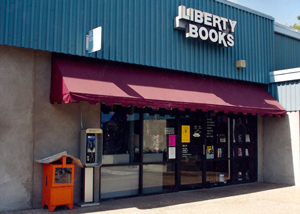 It
was a joke between Kip and me and Tom Doyal, who started the store a
year and a half before and who sold it to us in October 1988, that the
decor looked like a Christian Science Reading Room as opposed to a
retail shop—or an X-rated porn store (which we were not). Because AIDS
was a major issue in gay life in the 80s and 90s and Liberty Books had
the best-stocked collection of books about AIDS intown, including books
addressed to family members and parents, we had decided the store
should look like a place one would feel comfortable bringing their
mother.
It
was a joke between Kip and me and Tom Doyal, who started the store a
year and a half before and who sold it to us in October 1988, that the
decor looked like a Christian Science Reading Room as opposed to a
retail shop—or an X-rated porn store (which we were not). Because AIDS
was a major issue in gay life in the 80s and 90s and Liberty Books had
the best-stocked collection of books about AIDS intown, including books
addressed to family members and parents, we had decided the store
should look like a place one would feel comfortable bringing their
mother.
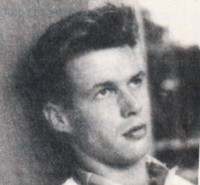 So Cliff would come in and sit and read.
So Cliff would come in and sit and read.
One day I was standing at the front counter chatting
with somebody about my Catholic religious life background and my
studies in comparative religions. Maybe the conversation had gotten
raucous and noisy—this wasn't a library, after all.
Cliff got up and walked over to the counter and asked
us to make less noise. He said he was trying to read this serious and
important book about the nature of religion and myth and we were
distracting him with our silly chatter. He held up the book. It was The Myth of the Great Secret by Edwin Clark Johnson.
I laughed, maybe a little sheepishly, and introduced myself as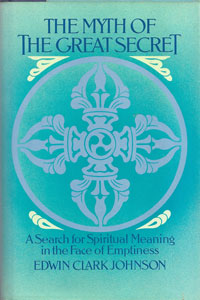 Toby and then added, "I'm Edwin Clark Johnson. That's my book you're reading."
Toby and then added, "I'm Edwin Clark Johnson. That's my book you're reading."
Cliff was always very smooth. I'm sure he took that in
stride. He explained that he'd recently moved back to Austin from
Seattle where he'd lived about a year; he'd found the book in the
library there and had started reading it. And now as wanting to finish
it.
That was the start of a wonderful friendship. Cliff
Douglas became part of our lives. He stayed with us for a little while
when we were living on Shoal Creek Blvd in the House Park Townhomes,
just across Lamar and Shoal Creek itself from the bookstore.
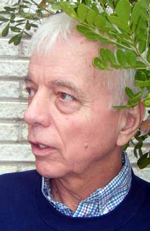
Cliff introduced us to his friend Dennis Paddie. (Here's a page on this website about Dennis.)
Tho' Cliff died in 1995, Dennis has remained our good friend and
occasional housesitter even to the present when I'm writing this
history down in December 2020.
Cliff was HIV+, and became a sort of
spokesperson/activist for self-healing and spiritual-healing at a time
when medicine had very little to offer. Cliff ran a study group for A Course in Miracles which was held at Casa de Luz, a New Age, hippie vegetarian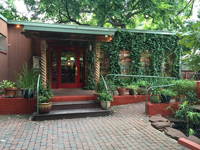 restaurant of high regard. Because I was also fascinated with the Course in Miracles (and had included it in a novel—a book that is now retitled as The Fourth Quill), I attended Cliff's study groups.
restaurant of high regard. Because I was also fascinated with the Course in Miracles (and had included it in a novel—a book that is now retitled as The Fourth Quill), I attended Cliff's study groups.
Cliff Douglas is important in Austin history, not just because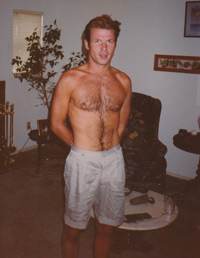 he was a cute and sexy gay man or because he had AIDS and tried to help
fellow PWAs cope with this awful disease, but because he—at least,
indirectly—changed the whole city ambiance.
he was a cute and sexy gay man or because he had AIDS and tried to help
fellow PWAs cope with this awful disease, but because he—at least,
indirectly—changed the whole city ambiance.
Part of his own self-healing was good eating, and that
included fresh juices and especially wheat grass juice. He discovered
he could actually create a paying job for himself selling his  favorite
healthy juices to runners going into and coming out of Zilker Park,
Austin's major greenspace on the south side of the Colorado River as it
passes through town (known then as Town Lake, now called Lady Bird
Lake). There was a running track along the river on both sides between
two bridges, making a full circle. Cliff set up a little juice cart on
Barton Springs Blvd where the road goes into the Park close to Barton
Springs Swimming Pool. He'd found what might have been an old postal
truck, along with a pull-behind trailer which he equipped with tanks
for the juices and an extractor to turn handfuls of wheat grass into
liquid shots. He'd drive over in the mornings and park on the side of
the road and sell juice to the runners passing by.
favorite
healthy juices to runners going into and coming out of Zilker Park,
Austin's major greenspace on the south side of the Colorado River as it
passes through town (known then as Town Lake, now called Lady Bird
Lake). There was a running track along the river on both sides between
two bridges, making a full circle. Cliff set up a little juice cart on
Barton Springs Blvd where the road goes into the Park close to Barton
Springs Swimming Pool. He'd found what might have been an old postal
truck, along with a pull-behind trailer which he equipped with tanks
for the juices and an extractor to turn handfuls of wheat grass into
liquid shots. He'd drive over in the mornings and park on the side of
the road and sell juice to the runners passing by.
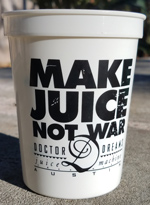 Cliff called his operation Dr. Dreams' Juice Machine. And developed a line of cups and T-shirts with his logo.
Cliff called his operation Dr. Dreams' Juice Machine. And developed a line of cups and T-shirts with his logo.
He even had photos of himself dressed up like a World War I aviator. There was a different photo for each of the four flavors he specialized in.
World War I aviator. There was a different photo for each of the four flavors he specialized in.
The only cup we have is Sky Juice.
Well, after a few weeks or so, Cliff was approached by
the police and told he couldn't just set-up shop on the side of the
street. AND he needed a commercial kitchen to produce the juice if he
was going to sell it to the public.
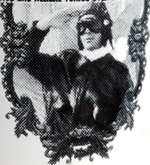 Dr.
Dreams disappeared for a little while and then reopened on Congress Ave
in what was then a vacant lot at 1221 South Congress across from the
Austin Motel and the then location of El Sol y La Luna Café, and just
north of Amy's Ice Cream. That space is now a residential complex
called The Lola.
Dr.
Dreams disappeared for a little while and then reopened on Congress Ave
in what was then a vacant lot at 1221 South Congress across from the
Austin Motel and the then location of El Sol y La Luna Café, and just
north of Amy's Ice Cream. That space is now a residential complex
called The Lola.
Cliff and his new boyfriend, John Lincoln, who'd be his
faithful lover until his death, and his old friend Dennis began making
the juices at a commercial kitchen they rented space in and then
selling it from the juice truck there on South Congress.
The vacant lot offered a lot of space and Cliff got
some other vendors to join him to sell T-shirts and tourist geegaws.
He'd created a mini-bazaar there on what was a fairly nondescript zone
on South Congress.
Cliff liked people and people and people liked Cliff.
He made friends with the storeowners further up the street. He pulled
together a South Congress Merchants Association.
He and John moved to New York for a short while and he
got sick during the winter. And then in 1995, just before the AIDS
cocktail became available, he died.
Cliff and John had gone down to the coast and Cliff had
gotten badly sunburned—worsened by the antibiotics he was taking for
AIDS opportunistic infections. The outer layer of skin all over his
body peeled off, leaving him vulnerable to more infections. 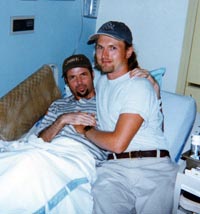 A
germ got into his hip and created a life-threatening infection. He was
hospitalized at Christopher House, an AIDS hospice, and after a week or
so, died in John's arms.
A
germ got into his hip and created a life-threatening infection. He was
hospitalized at Christopher House, an AIDS hospice, and after a week or
so, died in John's arms.
Cliff's last words were: "Yellow is a very big color
around here." His ashes, wrapped in yellow silk, were buried in his
family's plot in Frisco, Tx.
Dennis's longtime friend, Ed Smith, a stonemason, crafted the gravestone. (Link to James Clifton Douglas at Find-a-Grave)
Dennis had been out of the room, but arrived soon after
his passing and read a meditation on going into the afterlife. And he
called us; Kip and I arrived about a half hour later.
Several portions of the ashes were distributed to
friends. Kip and I kept a small stash in a mother-of-pearl perfume
bottle. Then in 2006, when we went traveling to India, we took Cliff's
ashes and scattered them in the Ganges in Varanasi at dawn near the
central burning/burial ghat. Our tour group was taken out on a small
boat to watch the dawn. Vendors were selling candles in cups made of
palm leaves to float on the water. We floated one of these on the river
and then Kip poured the ashes into the Sacred Waters.
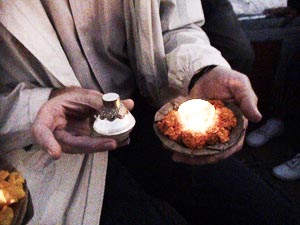
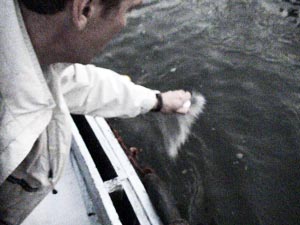
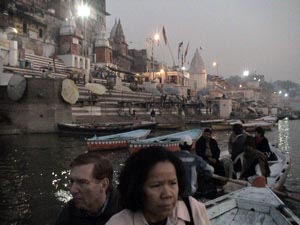
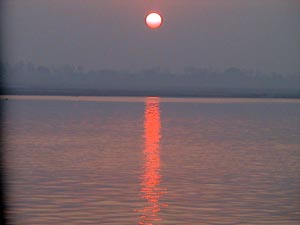
Cliff Douglas didn't start the Food Truck fad in Austin,
though perhaps he had been inspired by the fad in Seattle. And Cliff
didn't single-handedly create what has become the SoCo District, one of Austin's major shopping, dining, and tourism areas. But he was certainly there at the start.
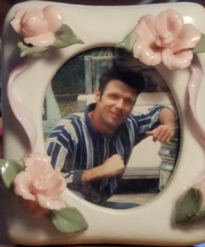 Cliff Douglas
Cliff Douglas Cliff Douglas
Cliff Douglas
![]()
